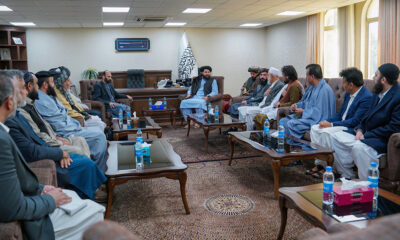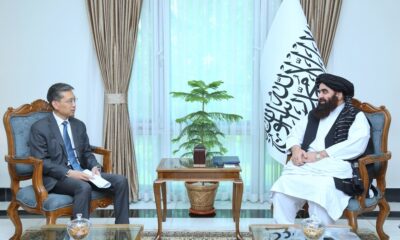Latest News
UN relief chief urges G20 to step up support to avert crises in fragile countries

The COVID-19 pandemic and resulting recession are set to trigger the first increase in global poverty in three decades, pushing 265 million people to the point of starvation by the end of the year, the UN’s top humanitarian official warned on Friday.
Mark Lowcock, Under-Secretary-General for Humanitarian Affairs and Emergency Relief Coordinator, called on the world’s leading industrial nations, the G20, to step up support, as he released an updated US$10.3 billion appeal to fight coronavirus spread in 63 low-income countries.
“The pandemic and associated global recession are about to wreak havoc in fragile and low-income countries”, he said.
“The response of wealthy nations so far has been grossly inadequate and dangerously short-sighted. Failure to act now will leave the free to circle round the globe, undo decades of development, and create a generation’s worth of tragic and exportable problems.”
“It doesn’t have to be like this – this is a problem that can be fixed with money from wealthy nations and fresh thinking from the shareholders of international financial institutions and supporters of UN agencies, the Red Cross and Red Crescent Movement, and NGOs,” he said.
As of Thursday, there were more than 13 million cases of COVID-19 worldwide, and nearly 580,000 deaths, according to the World Health Organization.
Lowcock fears that unless G20 countries act now, they will face a series of human tragedies more brutal and destructive than the direct health impacts of the pandemic.
“Rich countries have thrown out the rulebook when it comes to protecting their own economies. They must apply the same exceptional measures to countries that need help”, he declared.
“The prospect of cascading crises more brutal and destructive than anything the virus alone can do must jolt us all out of our comfort zone.”
UN agencies estimate that due to disruptions to health systems caused by the pandemic, some 6,000 children could die every day from preventable causes, while annual deaths from HIV, tuberculosis, and malaria, could double.
Meanwhile, humanitarians said the first confirmed case of the disease was reported in Idlib, Syria, last week, sparking fears of a devastating outbreak in crowded camps housing millions of people displaced by the country’s nearly decade-long conflict.
The COVID-19 Global Humanitarian Response Plan addresses the humanitarian impacts of the pandemic in 63 low- and middle-income countries and supports their efforts to combat it.
The plan prioritizes the world’s most vulnerable citizens, including older persons, people with disabilities, displaced people, and women and girls.
It was initially launched in late March, shortly after WHO declared the global pandemic.
While $1.7 billion has been raised since then, the update includes a supplementary $300 million, to bolster rapid response from NGOs, $500 million for famine prevention, and a sharper focus on preventing gender-based violence.
This comes after two Rome-based UN agencies sounded the alarm in a joint report published on Friday stating that hunger threatens to soar to devastating levels in 25 countries in the coming months due to the impact of the global COVID-19 pandemic.
The World Food Programme (WFP) and Food and Agriculture Organization (FAO) warned the greatest concentration of need is in Africa, but countries in Latin America and the Caribbean, the Middle East and Asia – including middle-income nations – are also being ravaged by crippling levels of food insecurity.
WFP announced that it is scaling up food assistance to an unprecedented 138 million people who face desperate levels of hunger as COVID-19 tightens its grip on some of the world’s most fragile countries.
“Three months ago at the UN Security Council, I told world leaders that we ran the risk of a famine of biblical proportions”, said WFP Executive Director David Beasley.
“Today, our latest data tell us that, since then, millions of the world’s very poorest families have been forced even closer to the abyss”, Beasley said.
“Livelihoods are being destroyed at an unprecedented rate and now their lives are in imminent danger from starvation”, he said.
“Make no mistake – if we do not act now to end this pandemic of human suffering, many people will die.”
Most of the 25 “hotspots” named in the report stretch from West Africa and across the Sahel (north Africa) to East Africa, including the Sahel, as well the Democratic Republic of the Congo, Mozambique, and Zimbabwe.
It also identifies, in the Middle East, Iraq, Lebanon, Syria, and Yemen; in Asia, Bangladesh; and in Latin America and the Caribbean, El Salvador, Guatemala, Haiti, Honduras, Nicaragua, and Venezuela.
Citing some examples, the report says that COVID-19 is compounding a raft of existing problems in South Sudan, making the prospect of famine loom ever larger in areas where inter-communal fighting makes humanitarian access tough or impossible.
In the Middle East, the pandemic is exacerbating Lebanon’s worst-ever economic crisis, where food insecurity is growing fast not only among citizens but also 1.5 million Syrians and other refugees.
Hardest hit in Latin America are more than five million Venezuelan migrants, refugees, and asylum-seekers in neighboring countries, the report says, adding that worsening economic conditions in host countries could well make matters worse.
According to WFP estimates, the number of people living in acute food insecurity in countries affected by conflict, disasters or economic crises could jump from 149 million before the pandemic took hold to 270 million by year’s end if assistance is not provided urgently.
Latest News
Russia’s special envoy meets with IEA ministers, discusses bilateral issues
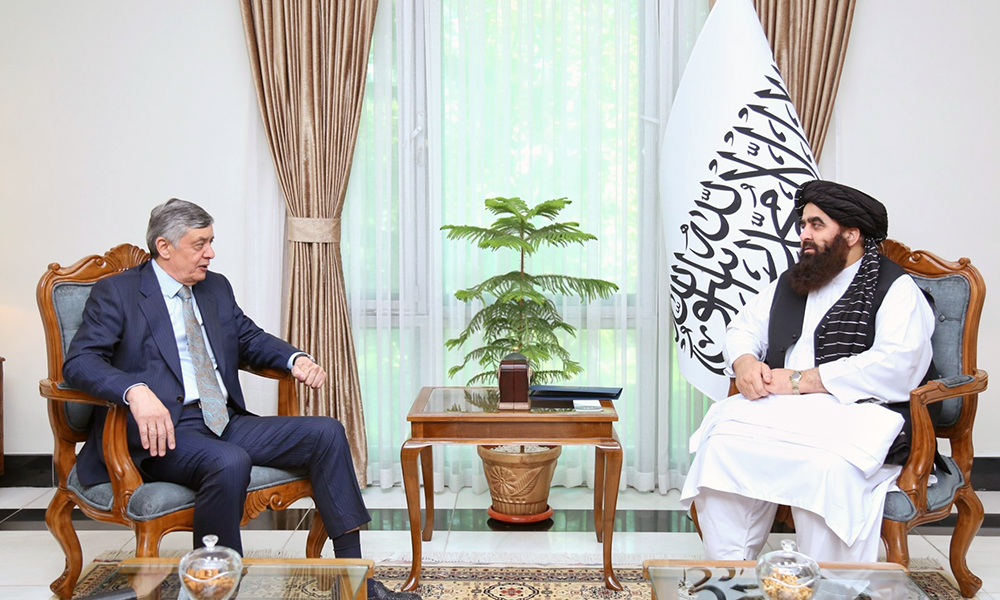
Zamir Kabulov, the Special Representative of the President of the Russian Federation for Afghanistan, who is on a visit to Kabul, has met with the Minister of Foreign Affairs of the Islamic Emirate Mawlavi Amir Khan Muttaqi for talks on political and economic issues between Afghanistan and Russia.
Regional issues were also discussed.
Muttaqi expressed appreciation for Russia’s support at regional and international meetings and emphasized the need to further strengthen political ties and trade relations between the two countries.
He also said that Afghanistan’s relations with countries in the region are flourishing and currently Afghanistan has active embassies in all neighboring countries.
Muttaqi called Afghanistan’s relations with Russia important and said the current ground realities of Afghanistan should be understood and that there is no reason why the United Nations needs to appoint a special representative to deal with Afghanistan.
He said the Afghan government is in talks with the UN over this issue and will make public its position after sufficient clarification has been provided on the agenda and composition of the next UN meeting in Doha.
Kabulov in turn stressed that any meeting held on Afghanistan should be convened with the approval of the Afghan government.
He said it is important for the United Nations to have the Afghan government approve and attend the next Doha meeting.
He said this series of meetings will not yield positive results without the Afghan government being in agreement.
He also said governments of the world should maintain relations with the Afghan government through bilateral mechanisms instead of multilateral contact mechanisms.
Kabulov emphasized that the US should release Afghanistan’s frozen assets and end its unilateral and “illegal” restrictions on the country’s banking system.
He also said Russia and Afghanistan need to improve coordination between them and went on to say he hoped Muttaqi would visit Moscow during the course of this year.
Kabulov also met with acting Minister of Interior Affairs Sirajuddin Haqqani.
This meeting focused on bilateral relations between both countries while political and security issues pertaining to the region were also discussed, the ministry said.
Latest News
Afghans in Europe Union members meet with ministers of defense, mining
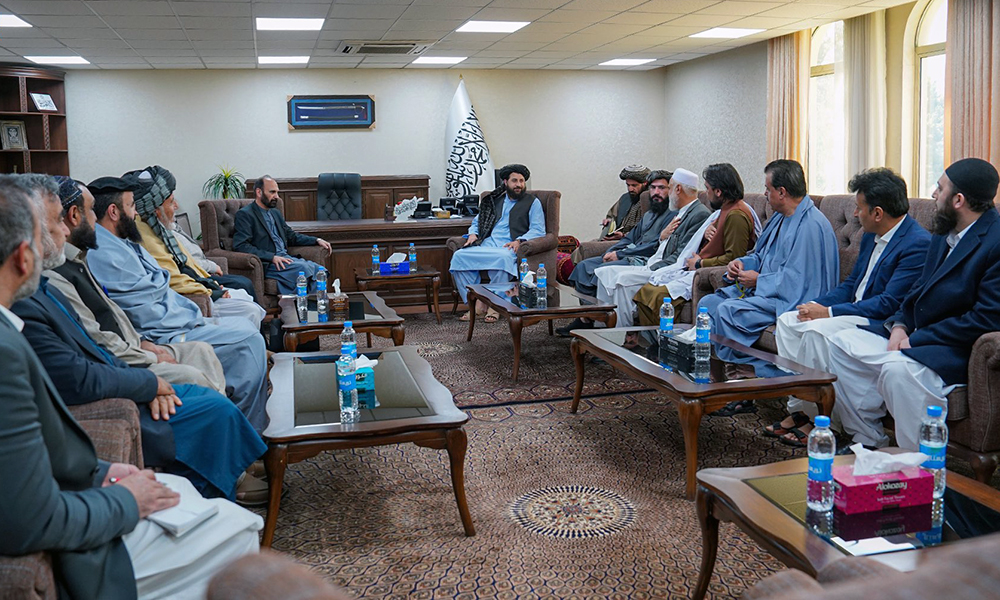
Representatives of the Union of Afghans living in Europe on Tuesday met with the ministers of defense and mining for talks on several issues.
Acting Minister of National Defense Mohammad Yaqoub Mujahid said in a meeting with union delegates that the current security situation in the country has provided an opportunity for everyone to participate in the progress of Afghanistan.
Mujahid added that there were still some problems in certain areas but that these will be removed.
In this meeting, Mujahid called Afghanistan the common home of all Afghans and said the problems in the country will be solved soon.
“The problems that exist in some issues will be solved soon; but there was nothing more than the security that has been revealed in this land today with the help of Allah and with the sacrifices of our people,” he was quoted in a statement as saying.
According to the statement, a number of Afghans, who only moved to the country after the Islamic Emirate’s takeover, expressed their satisfaction with the current situation in the country.
In addition, Shahabuddin Delawar, acting Minister of Mines and Petroleum, also met with union representatives and asked Afghans living abroad to return to Afghanistan and contribute to the country’s progress.
In this meeting, the Afghans living in Europe asked Delawar to provide better facilities to Afghans who want to invest in the country. The Ministry of Mines and Petroleum says that Delawar also asked the visiting delegation to return to Afghanistan and contribute to the country’s development.
Earlier, in a meeting with a number of other officials of the Islamic Emirate, including the political deputy of the Prime Minister and the Acting Minister of Foreign Affairs, this delegation emphasized the need to strengthen the system and provide work and education to Afghan girls and women.
Latest News
Regional developments require Afghanistan, China’s full coordination to protect interests: Muttaqi
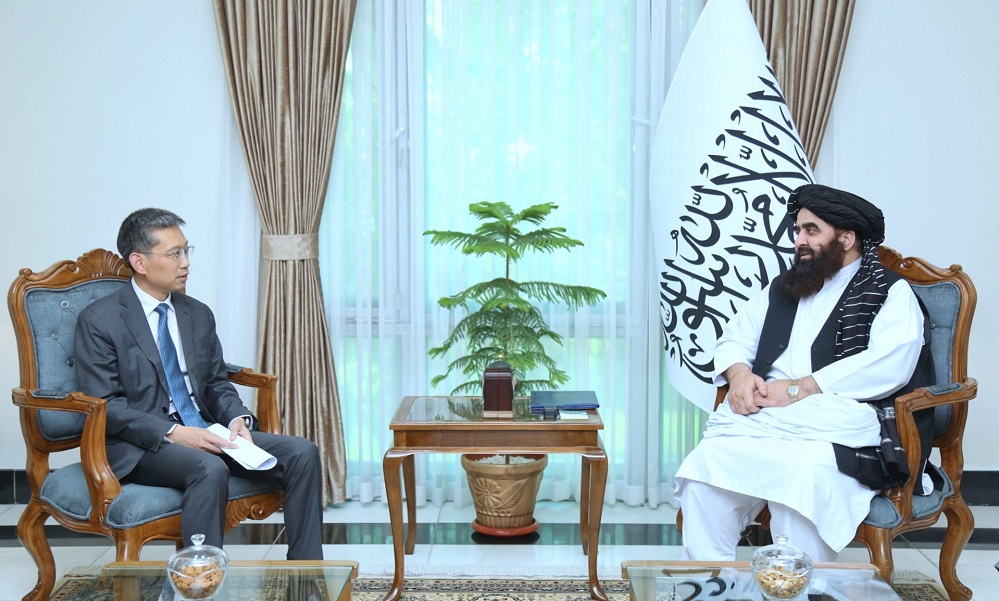
Acting Minister of Foreign Affairs Amir Khan Muttaqi has said that recent events and developments in the region require that Afghanistan and China continue their cooperation in full coordination so that they can protect their common interests.
Muttaqi stated this in a meeting with the Chinese ambassador in Kabul Zhao Xing.
The Ministry of Foreign Affairs said in a statement Tuesday that the two sides discussed bilateral political, economic and cultural cooperation between Afghanistan and China and the recent developments in the region.
Muttaqi expressed his satisfaction with the expansion of political, economic and cultural relations between the two countries and said that the Islamic Emirate has created good opportunities in the field of trade and investment.
He pointed out that the increase in the export of pine nuts to China and the progress in the Mes Aynak and Wakhan Corridor projects are clear examples of this policy of the Islamic Emirate.
According to the Ministry of Foreign Affairs’ statement, the Chinese ambassador considered the developments in various fields with Afghanistan as positive and added that he seeks to encourage Chinese businessmen and investors to play their role for long-term economic cooperation with Afghanistan.
He also said that his country is considering ways of bilateral cooperation and resources regarding Wakhan Corridor.
-

 Sport5 days ago
Sport5 days agoRashid Khan threatens BBL pullout after Australia postpones Afghanistan T20I series
-

 Business5 days ago
Business5 days agoCommerce ministry inks 10 MoUs to boost development of small and medium-sized businesses
-

 Latest News5 days ago
Latest News5 days agoOver 6,000 acres of land cleared of poppies in Badakhshan
-

 Sport4 days ago
Sport4 days agoAfghanistan Champions League kicks off with grand opening ceremony
-

 Latest News3 days ago
Latest News3 days agoPakistan’s frontiers minister stresses ‘dignified’ return of Afghan refugees
-

 Regional4 days ago
Regional4 days agoIran’s foreign minister downplays drone attack, says Tehran investigating
-

 Latest News5 days ago
Latest News5 days agoTen people killed by floods in Helmand
-

 Business4 days ago
Business4 days agoAfghanistan’s economic prospects are bleak: World Bank






